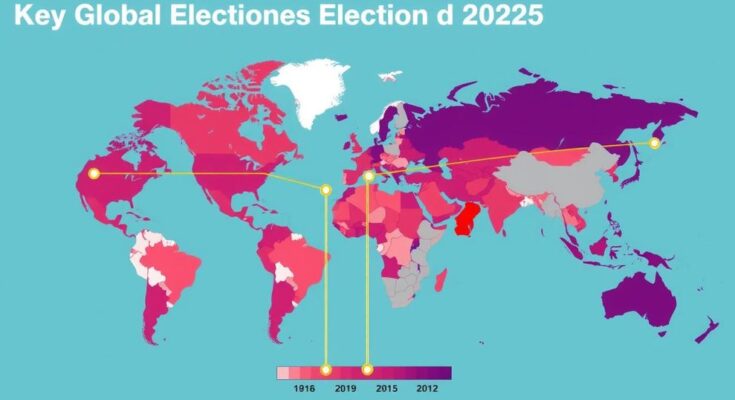In 2025, several significant global elections will unfold, with critical implications for Belarus, Germany, the Philippines, Canada, and Chile. Key themes include authoritarianism, economic challenges, and internal political disputes. These elections may reshape national governance and have consequential impacts on global relations.
In 2025, several significant global elections will take place, albeit not as densely populated as 2024. Key themes include the effects of inflation, the rise of right-wing populism, and geopolitical tensions stemming from wars in Europe and the Middle East. The elections in Belarus, Germany, the Philippines, Canada, and Chile will shape political landscapes in these regions, reflecting local and global challenges. This analysis explores the stakes involved in each election and potential outcomes that could arise from them.
In Belarus, the presidential election on January 26, 2025, sees incumbent Alexander Lukashenko seeking his seventh term. With no real opposition present due to a history of repression and fraught political conditions, predictions suggest Lukashenko will maintain power, aligning Belarus closely with Russia. As it stands, the electoral process lacks validity and represents an enduring authoritarian regime.
Germany is poised for a snap federal election on February 23, 2025, following a collapse of the coalition government. Chancellor Olaf Scholz’s dismal approval ratings position him at risk of losing power, likely to Friedrich Merz of the Christian Democratic Union. The increasing global pressures from the Ukraine war and economic challenges emphasize the need for stable governance amid turmoil.
The Philippines will conduct midterm elections on May 12, 2025, which traditionally serve as referendums on the current presidency. President Ferdinand Marcos Jr. aims to solidify his political control amid internal party disputes, particularly with Vice President Sara Duterte. A strong Senate led by Marcos’s allies may enhance his position against political adversaries.
Canada’s federal election could occur before the constitutionally mandated date of October 20, 2025, as Prime Minister Justin Trudeau faces mounting challenges. A potential conservative shift under Pierre Poilievre may lead to critical changes in Canadian identity and political direction, focused on economic issues and response to global pressures.
Chile’s presidential election is set for November 16, 2025, with an anticipated runoff on December 14. Current President Gabriel Boric, restricted from seeking re-election, has faced legislative hurdles, making the opposition’s chances of success increasingly plausible. Voter sentiment reflects growing concerns over crime and governance, complicating the electoral landscape further.
As nations navigate economic instability and political unrest, 2025 will see pivotal elections that may redefine governance in crucial regions. Central issues such as inflation, civil liberties, and foreign influence are expected to dominate the electoral discourse in Belarus, Germany, the Philippines, Canada, and Chile. An understanding of these political contexts is essential to appreciating the implications of the electoral outcomes to regional and global politics.
The elections in 2025 represent critical junctures for each highlighted country, potentially reshaping political trajectories and alliances. In Belarus, the absence of genuine opposition underscores a continuing authoritarian grip. Germany faces an uncertain future amidst governmental instability, while the Philippines grapples with internal power dynamics. Canada stands at a crossroads of identity and governance, and Chile may encounter a shift in political power after years of unrest. Overall, the outcomes will collectively influence broader geopolitical dynamics.
Original Source: www.ndtv.com




